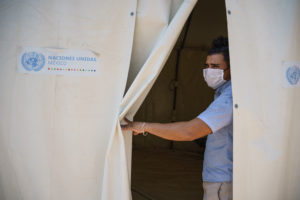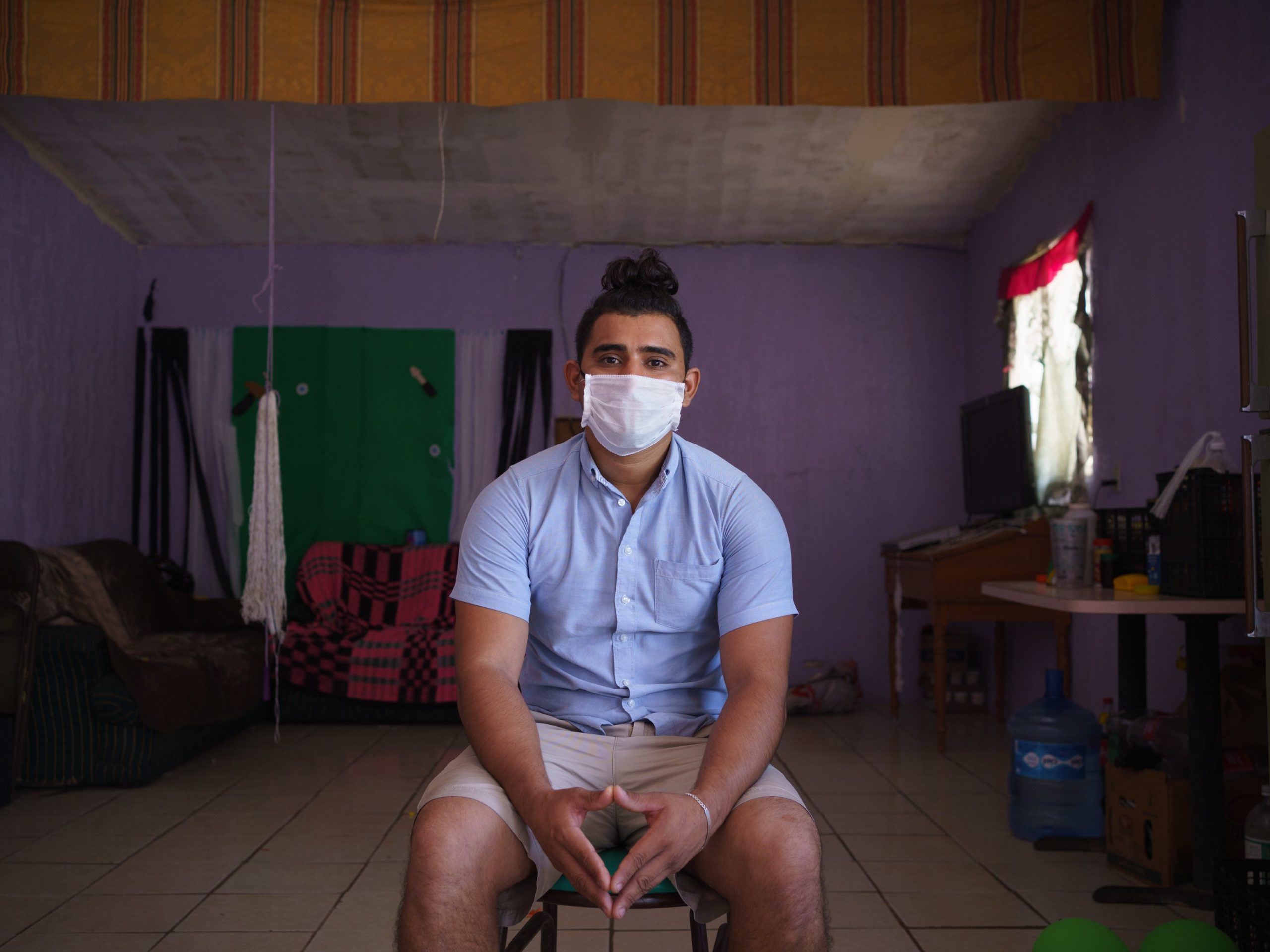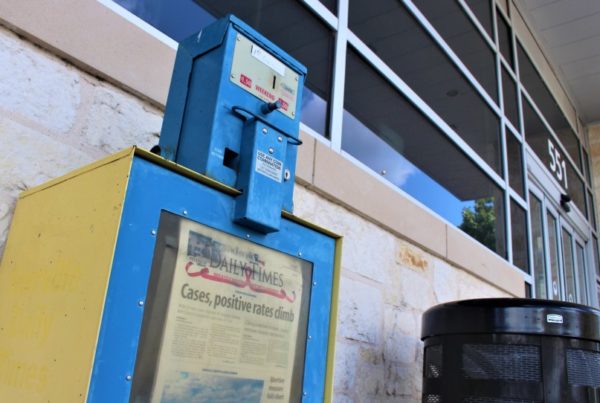This story is the fifth in a five-part series “The Asylum Trap: Stories From Migrants Forced To Wait In Mexico While Seeking Asylum.”
When José fled political persecution in Nicaragua, he wasn’t expecting to find love.
Like tens of thousands of other asylum seekers who arrived at the U.S. border since Jan. 2019, he was sent to wait in Mexico while his case played out in immigration court, under a policy known as “Remain in Mexico.”
José — who worked as a nurse in Nicaragua — ended up at a migrant shelter in Ciudad Juárez. He noticed a shy woman with a sweet smile, and they struck up a conversation. He learned she was from Guatemala, also seeking asylum.
José got her number, but not her name.
“I just put ‘guate’ in the phone,” he recalled, laughing.
The two began talking constantly. He brought her chocolate and shared some of his favorite food.
“I never thought I’d meet someone who I just connected with like that,” José said. “People say, ‘oh, that’s just a passing thing.’ But it’s not when you find the ideal person. Someone who gives you the support you were lacking, the embrace you didn’t have.”
They eventually moved in together, sharing a room at the shelter.
Their asylum cases are in different stages and their future is uncertain; she was denied protection and is appealing the decision, while he’s still waiting for his main hearing.
Still, José asked her to marry him. They’re currently engaged and expecting a baby next month.
We’re not using José’s full name in this story, or identifying his fiancée, because they are in the middle of immigration proceedings.
Like thousands of other asylum seekers stuck in legal limbo, they’re waiting to see what the presidential election brings.
“Changing the president obviously changes policies,” José said.

Jose, who oversees the Pan de VidaÕs medical needs, shows the isolation tents that were set up during the onset of the pandemic on August 26, 2020. Fortunately there hadnÕt been any cases at the shelter.
Photo: Paul Ratje For KERA
Unwinding ‘remain in mexico’
Democratic nominee Joe Biden has pledged to end “Remain in Mexico” — formally called the Migrant Protection Protocols, or MPP — within his first 100 days in office.
But as for how exactly his administration would unwind the program, “that’s the $64,000 question,” said Nicolas Palazzo, an attorney with Las Americas Immigrant Advocacy Center who represents clients in MPP.
The federal government could stop placing new asylum seekers in the program, but there is also the question of what will happen to the thousands of people who are currently waiting in Mexico, living in migrant shelters in Ciudad Juárez, a tent camp in Matamoros, and other difficult and dangerous places along the border.
“I don’t expect the last week of January for the gates to be open and people just allowed to shuffle in,” Palazzo said. “We’re talking thousands of people.”
He would like to see the administration create a safe, efficient system for paroling asylum seekers into the U.S., to wait out their legal proceedings in safer settings, with better access to attorneys.
“Can you imagine being a migrant living in Mexico, not knowing anyone, having very little resources and being able to effectively prepare and do all of the hard work that is involved in defending yourself in immigration proceedings and requesting asylum?” Palazzo asked.
Just 7% of asylum seekers in MPP have had legal representation, according to an analysis from the Transactional Records Access Clearinghouse (TRAC) at Syracuse University.
Asylum seekers could also make their cases in courtrooms where they’d likely face better odds, Palazzo said.
If they were allowed to enter the U.S. and join family or sponsors in different parts of the country, “their court case is gonna be changing venue, so it’s gonna leave El Paso and go to another jurisdiction like New York City or San Francisco where, quite frankly, the courts tend to have significantly lower denial rates of asylum,” he said.
José believes he has a solid case for political asylum. He carefully stores his documents in clear, plastic folders — things like his nursing degree and letters from community leaders, describing the danger he faces in Nicaragua.
In 2018, President Daniel Ortega proposed cutting social security, sparking national protests. Security forces cracked down violently on demonstrations; more than 300 people were killed.
José said healthcare workers were told not to treat wounded protestors. He provided care anyway and that, he said, made him a government target.
He was reluctant to leave his country and family, “but my mom told me, ‘I’d rather see you far away than see you dead.’”
The El Paso court handling MPP cases has received more than 20,000 asylum requests. Thousands of migrants are still waiting for decisions. But between March 2019 and Sept. 2020, only 22 of those applicants received asylum or another form of protection in the U.S., according to a TRAC analysis.

in Ciudad Juárez on September 26, 2020. For those in the Migrant Protection Protocols, their future hinges on the outcome of the 2020 election.
Photo: Paul Ratje For KERA
Unwinding ‘remain in mexico’
Getting removed from MPP and transferred to another court would be just the beginning for asylum seekers like José.
The Trump administration has taken more than 400 executive actions on immigration, including restricting who qualifies for asylum.
“The Trump administration’s approach to asylum at the southern border is assuming that no one is a legitimate asylum seeker,” said Sarah Pierce with the Migration Policy Institute, a nonpartisan think tank.
Even with a new administration, “it’s difficult to say how they would unwind the many interlocking policies at the southern border,” she said.
Still, because MPP was handed down as a policy — “really, just a memo” — it could be easier to roll back than some other changes to the asylum process, according to Pierce. Because it’s not a law or executive order, a new administration could immediately end the program.
But even if the program is dashed on day one, questions remain — like whether people who were placed in MPP and then ordered deported might be allowed to reopen their cases.
If Trump is re-elected, MPP is also being challenged in court. On Oct. 19, the Supreme Court announced it will review a case claiming the policy violates immigration law. The justices will hear the case in 2021.
Whatever the results, Pierce said the U.S. government needs to address the new reality at the U.S.-Mexico border. More families are arriving, seeking asylum; in the past, it was mostly single men looking for work, who were quickly deported. She said the government needs to develop a system where families and children can be processed efficiently and humanely.
Otherwise, she said, “that’s how we end up with children staying in facilities for weeks that were meant to hold adults for two hours.”
For now, José tries his best to stay busy while he waits for election results.
He puts his nursing skills to use, visiting migrant shelters to help care for other pregnant asylum seekers. Knitting is his favorite mental escape; he’s currently working on a volleyball net for his shelter.
He and his fiancée turn to each other for strength.
“She’s given me a lot of emotional support and I’ve tried to support her,” José said. “Saying, ‘don’t get down. Come on, let’s go out, get some taquitos in the Plaza to cheer up.’ We just give each other understanding, affection.”
One way or another, they and thousands like them are hoping MPP comes to an end, so they can start rebuilding their lives.
Mallory Falk is a corps member with Report For America, a national service program that places journalists into local newsrooms. Got a tip? Email Mallory at Mfalk@kera.org. You can follow Mallory on Twitter @MalloryFalk.














